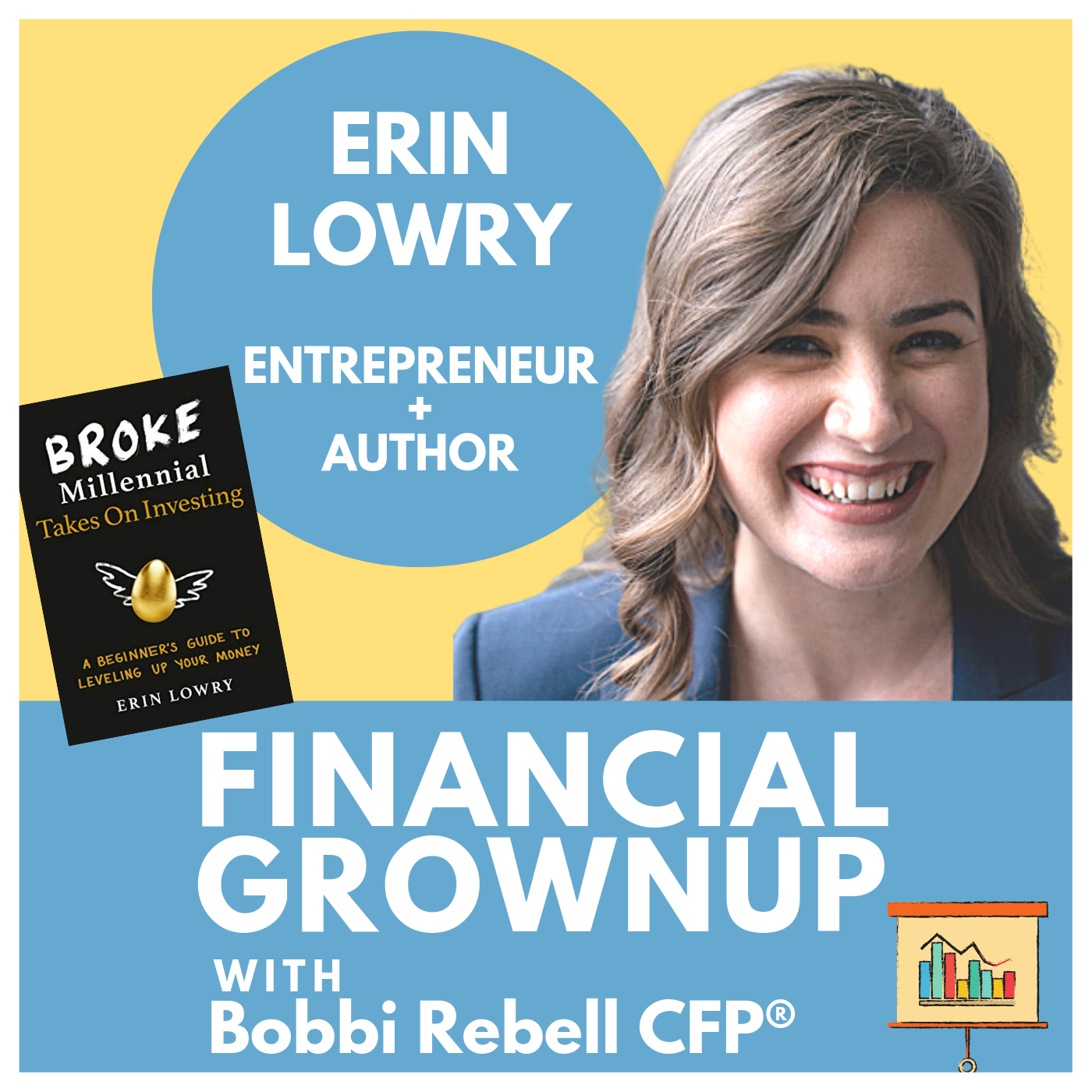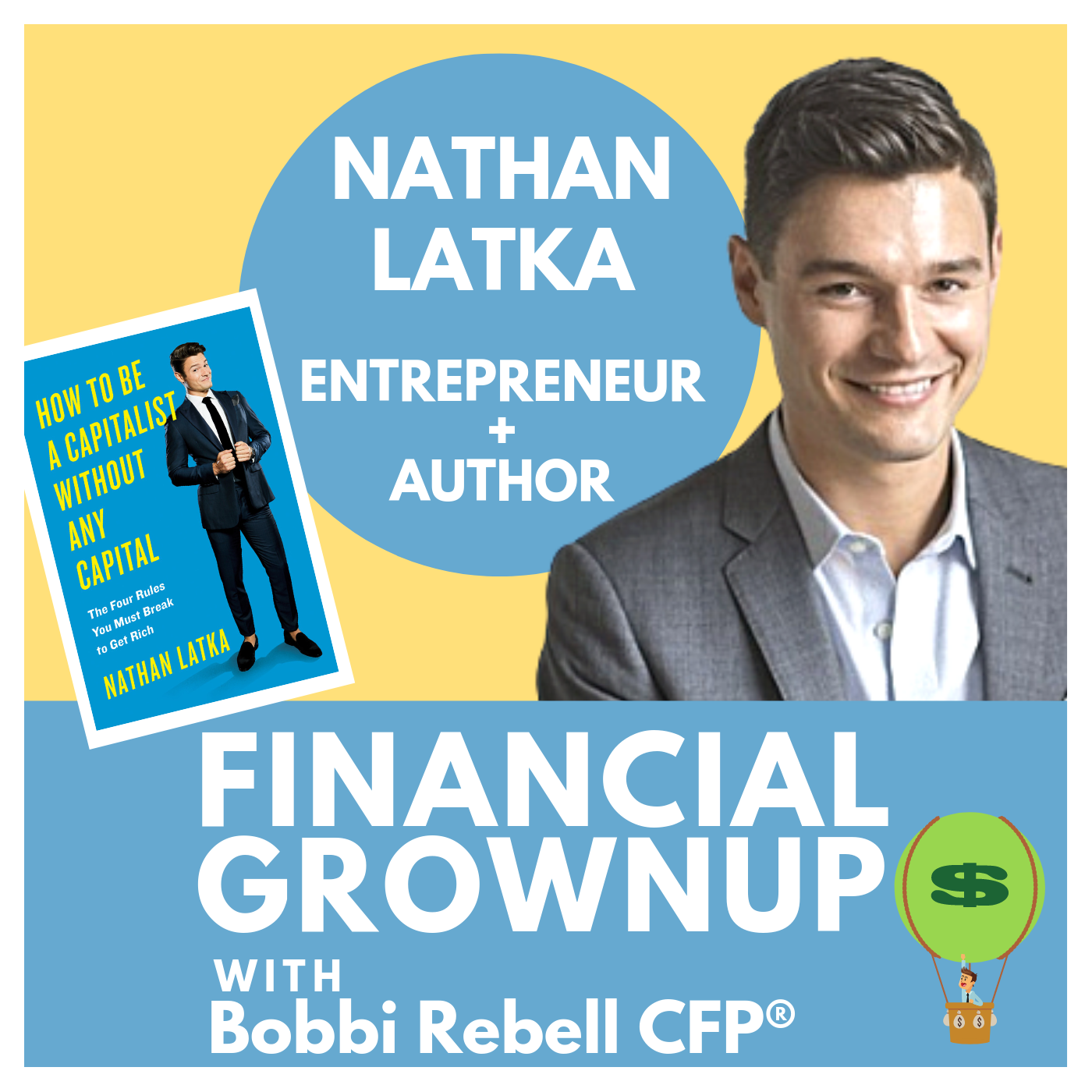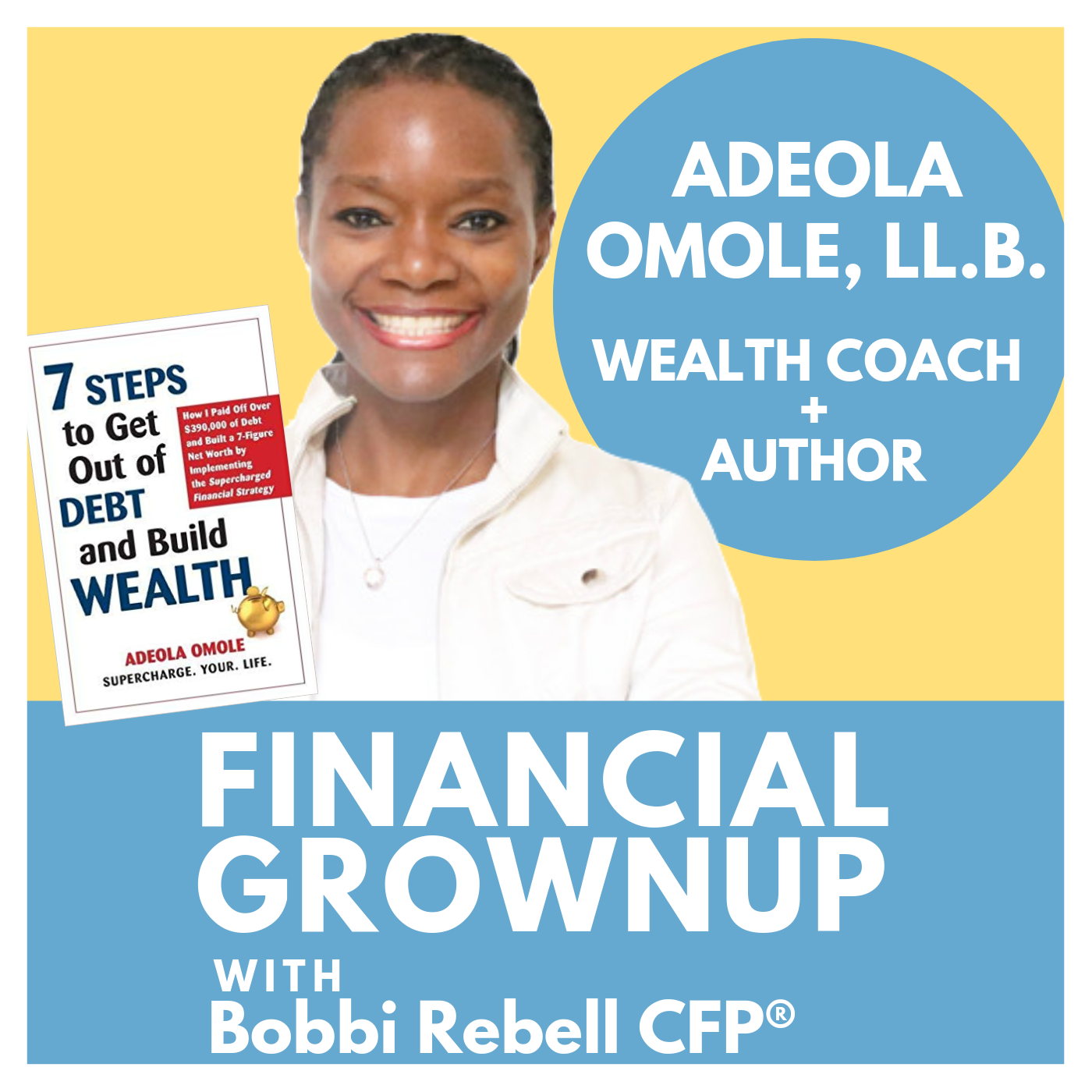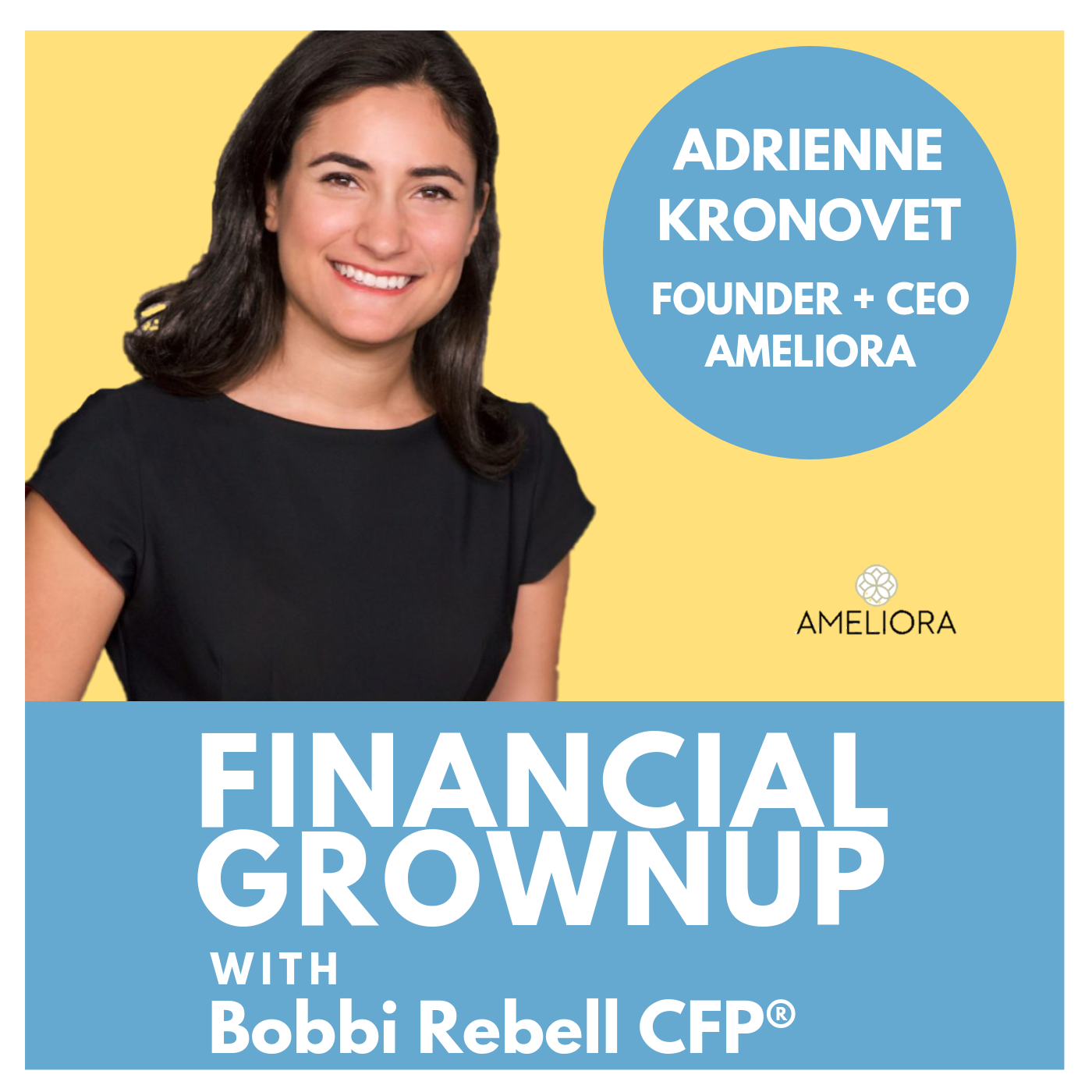Some of the links in this post are affiliate links. This means if you click on the link and purchase the item, I will receive an affiliate commission at no extra cost to you. All opinions remain my own.
Transcription
Erin Lowry:
My editor wrote me back and said, "Hey, this amount seems pretty high for a mid 20-something who's healthy." And I thought, "You know what? You're right." Then it dawned on me, "Uh-oh, he probably got a whole life insurance policy."
Bobbi Rebell:
You're listening to you Financial Grownup with me, certified financial planner, Bobbi Rebell, author of How to Be a Financial Grownup, and you know what? Being a grown up is really hard, especially when it comes to money, but it's okay. We're going to get there together. I'm going to bring you one money story from a financial grownup, one lesson and then my take on how you can make it your own. We got this.
Bobbi Rebell:
Hello Financial Grownup friends. Have you ever had a conversation with someone that in your mind was totally straight forward? The conversation was totally straight forward with no room for error or misunderstanding, super clear and clear to them, they said they got it, but there was one deal once you didn't realize you had been silent to and they didn't know to ask about and that caused things to go very wrong? Well, it happened to newlywed author, Erin Lowry, and it serves as a real warning to all of us because it can happen to a money expert and her new husband.
Bobbi Rebell:
Welcome, by the way, and thanks for joining us, new listeners, so glad you have found us. DM me if you have a sec, bobbirebell1 on Instagram, Bobbi Rebell on Twitter and let me know how you discovered the show and what you would like to hear. We do this for you. Let's get to our guest. Her new book is Broke Millennial Takes On Investing, which after you hear more about it will definitely be something you want to pick up. Here is Erin Lowry.
Bobbi Rebell:
Hey, Erin Lowry, you're a financial grownup. Welcome to the podcast.
Erin Lowry:
Thanks for having me.
Bobbi Rebell:
I'm so excited. I've been waiting to have you on my show for over a year and we said we're going to wait and hold off until your next book comes out and it's happening. It is Broke Millennial Takes On Investing and people should know this. This is a followup to your first book, Broke Millennial, and there's actually going to be a third one, which is pretty unheard of to do like a three ... Do we call it a hat trick to get a three book deal? That's pretty amazing. So congratulations on all.
Erin Lowry:
Thank you.
Bobbi Rebell:
We're going to talk more about Broke Millennial Takes On Investing, but first we're going to do your money story. You're a newlywed. Congratulations on your wedding and that comes with merging finances and you start to learn about the love of your life in different ways. In this case you learned that your now husband did the right thing, but made the wrong choice in a big financial decision and it just shows how complicated things are. It had to do with student loans and insurance. Tell us the story.
Erin Lowry:
It also shows that when you give somebody advice they take it sometimes, but don't take it in the way that you intended, which was a big part of what happened here. And for context, my husband, whom I call Peach, he has student loans. When this whole thing went down, first of all, it was not an insignificant amount. I don't really share his number, but it was a hefty chunk of change.
Bobbi Rebell:
And we're talking about student debt?
Erin Lowry:
Student loan debt. Yep. And a big chunk of those student loans were private student loans that his parents had cosigned on, which meant that if something happened to him, his parents would still be responsible for paying off those loans and by something happening, I mean, if he died, and the debt was still there. His parents would still be required to pay off that student loan debt. Now, I want to say right now, some companies have changed their policies and started to discharging debt and most federal student loans can be discharged in death, but not necessarily the case with private.
Erin Lowry:
After we have this conversation, this was a few years before we got married, I said, "I think it would be prudent for you to get a life insurance policy on yourself because seriously having forbid something happen, your parents are still on the hook for a lot of money and that could really impact their ability to retire. So you should have a life insurance policy that has them as the beneficiaries."
Bobbi Rebell:
Right. And the good news is he took your advice.
Erin Lowry:
He did. And I just kind of said it. I wasn't even necessarily like, "Go do this right now." He went and got a life insurance policy and a few months later I was actually writing an article on life insurance and I interviewed him for it. He told me how much he was paying every month and what the payout would be. And I wrote the article up and my editor wrote me back and said, "Hey, this amount seems pretty high for a mid 20-something who's healthy."
Erin Lowry:
I thought, "You know what? You're right." And then it dawned on me, "Uh-oh, he probably got a whole life insurance policy." So I go back and I went, "Hey babe, what kind of life insurance policy did you get?"
Bobbi Rebell:
"Hey babe, let's talk life insurance tonight?"
Erin Lowry:
So sexy. It's such a great topic. He had indeed gotten a whole life insurance policy and I tried not to get any sort of aggressive about it. He was like, "Why?"
Bobbi Rebell:
He's like, "Aren't you proud of me? I went out and got life insurance just like you said," and he had actually talked to somebody. He didn't even go out blindly and just kind of buy it ... I don't even know if you can literally just buy it on the web. There's obviously a step that you have to take. But he did proactively talk to somebody about it and get "advice" and I put advice in quotation marks.
Erin Lowry:
And that was where the problem was, is the person that he talked to was essentially pitching him a product, and listen, the pitch on whole life insurance is great. It does sound really good, I get it. But on the backend, this salesperson, and I'm going to call them a salesperson also probably got a commission for signing him up for whole life insurance. This is a fiduciary versus suitability conversation. Fiduciary meaning it's in your best interest. Suitability, just meaning it's suitable for you. Whole life is suitable for him, but it certainly wasn't the best product for him, what his needs were and what his age was.
Erin Lowry:
Even what it is now, it doesn't make sense for him.
Bobbi Rebell:
Could you explain a little bit about why? Why was whole life insurance not right for him and how is that different from term life, which is what was appropriate for him.
Erin Lowry:
Without getting into the weeds on technicalities, a big part of it really is one, the monthly premium that you're paying on a whole life insurance policy is usually significantly more expensive than term. Significant can be kind of a subjective term, but he was at the time in his mid 20s trying to pay off student loans, living in New York City and he's a public school teacher. So $25.50 a month in his budget does make a really big difference.
Erin Lowry:
That was thing one and two term life insurance is usually much lower monthly payments, typically a higher payout. It's just for a shorter period of time and it's a use it or lose it policy. So if you stay alive, which "Yay! You stay alive," and don't use it, the policy eventually just expires. So some people don't like this feeling of, "Well, I never see a return on my money," but that's true. Really most insurances that we pay for, if you have auto insurance and never get in a car accident, yay, you didn't get in a car accident, but also what were you paying for? You we're just paying for the protection.
Bobbi Rebell:
Right, so term life does not have an investment component and therefore when the term is over, if you do not use it, which we hope we don't use it, there is nothing left. There's no benefit at all. You have just spent the money and the money that you spent on those premiums is gone, but it is less money.
Erin Lowry:
It's less money. You can be putting the money that you're not spending towards other financial goals and or investments. The other thing you've got to think about is does this particular product make the most sense for you? Whole life insurance does make sense for some people. It didn't make sense for him at the time. Maybe way down the line it will make more sense, but right now all he needed was a basic simple term life insurance policy.
Bobbi Rebell:
What finally happened?
Erin Lowry:
He called the folks back up that had sold him the whole life insurance policy and said, "Hey, this isn't actually what I wanted. I want a term policy." The woman tried to talk him into staying with the whole, he was adamant-
Bobbi Rebell:
No. Oh, I hate that.
Erin Lowry:
Yep. So there was a back and forth, but he was adamant about switching to term. He switched to term, has a really basic policy. Now that we're married, actually we have to have a whole other conversation about life insurance as well in our own estate planning, but he still does have that policy because those student loans still do exist. We're working on getting rid of them and his parents are still the beneficiary because again, if something happened to him, even though he and I are married, if something happens to him, his parents would still be on the hook for those particular student loans. They didn't transfer it to me in our marriage.
Bobbi Rebell:
And he was able to get out of the whole life insurance policy? He wasn't locked in?
Erin Lowry:
He wasn't locked in. He was able to switch.
Bobbi Rebell:
That's great.
Erin Lowry:
Yeah, it's the same company actually. He didn't switch companies, but he did completely switch policies.
Bobbi Rebell:
What is the lesson for our listeners? It sounds like they really need to understand fiduciary versus a salesperson.
Erin Lowry:
The big thing is understanding fiduciary versus suitability. And for me, I also use this story in my book to talk about sniffing out a scam. I don't want to say he was necessarily scammed in the way that we traditionally think, especially when we think about investing, but he was definitely sold a product that wasn't the best fit for him. And I want you to consider that anytime you're working with any sort of professional, because they don't necessarily have your ultimate best interest in mind, they might also have their bank account in mind and you need to know how that person is getting paid.
Erin Lowry:
For instance, if you're a financial adviser gets paid on commission, you need to understand how that's going to be impacting your overall portfolio. What products are they putting in there that they get a kickback for? Now, I'm not saying everybody that takes commission is working in any sort of nefarious ways, but I am saying you need to make sure you understand exactly what that means for you and your investments. And again, fiduciary means they are required to act in the best interest of you. Suitability means they just can't do anything that's harmful to you.
Bobbi Rebell:
All right, let's talk about your everyday money tip. It's something you really do and it has made a big difference in your life.
Erin Lowry:
Yes, and this is going to sound so silly to people, but I like to save $5 bills, and I know a lot of people don't use cash anymore. I still do like to use cash and every single time I get a $5 bill back when I pay for something in cash, I put it inside in a little jar and just let that money accumulate. And then eventually I put it all in my bank account. And in 2018, I saved over a thousand dollars to put towards my honeymoon fund account just with this tiny little trick.
Bobbi Rebell:
Love that. So let's just talk briefly about your latest book, number two, out of your three book series, Broke Millennial Takes On Investing. Tell us more about what sets this apart and the kind of advice that people could expect from the book?
Erin Lowry:
This is a true beginners guide to investing and that's the way I like to position it. Also, I'm not an investing expert. What I like to consider myself in this book is a translator. So I went out and interviewed a bunch of very, very smart, very experienced people and was able to distill this into a more digestible package. But the reason I wrote the book is because, listen, there are great investing books out there, but a lot of them do kind of operate under the assumption that you have some base level knowledge when it comes to investing. And frankly, most of us don't when we're just getting started.
Erin Lowry:
So I wanted to write a book that bridged the gap. It assumes that you have no background in investing, no base level knowledge and if you do, great, there's still content for you, but you don't need to know what asset allocation or index funds are or time horizon means or anything like that in order to pick up my book. It also really talks a lot about the emotional side of investing and how to kind of get control over that because a lot of us do fear and are intimidated by the market.
Bobbi Rebell:
And I love the fact that you actually have a ton of just plain definitions in the book.
Erin Lowry:
Yes. There's a whole chapter about having this sort of baseline understanding of terminology and I even kind of apologize and the beginning of, "Hey, I know this is about to get real technical bear with me," but it's important that you understand the language because these are the terms you're going to hear when you're out there as an investor and you want to make sure you know what people are talking about.
Bobbi Rebell:
Yes. And never be afraid to ask a question that you "think is dumb," because there've been times I've asked questions that I'm embarrassed to ask and you know what? The person I'm asking doesn't actually know the answer. They're kind of faking their way through it, so don't fake it and pretend you understand something when you don't. It's okay. Ask the questions or look it up in Erin's book. There you go.
Erin Lowry:
That was actually one of my favorite parts of writing this book is learning terms and like, "Oh, that's what a basis [inaudible 00:12:22] is." It really wasn't helpful.
Bobbi Rebell:
A lot of people gloss over those things and don't actually know what they mean. You would be surprised. Just say. Great. Give us all your socials and where people can find out more about the book and you.
Erin Lowry:
I am on Instagram @brokemillennialblog, on Twitter @BrokeMillennial, Facebook the same. You can find a lot of information about me on my website, brokemillennial.com, and both my first and second books are available wherever books are sold. Amazon, Barnes & Noble, Powell's, Indie books, hopefully your local bookstore and I always like to make a plug for your local library and if it's not there, please request it and get it on the shelf.
Bobbi Rebell:
And make sure everyone follow her on Instagram. She does great AMA, so that's one of my favorite parts of all of your social. So thank you Erin.
Erin Lowry:
Thank you so much for having me.
Bobbi Rebell:
Okay, my friends. Let's do this. Financial Grownup tip number one. There's a lot of financial jargon out there. Erin talks about it a lot. If you are making a financial decision, make sure you take the time to look up the words you don't understand. I get it. It can be embarrassing to ask someone something you think you should know, but by the way, a lot of times those people are nodding along pretending they fully get it and they may not or they may think they get it and they don't really know the questions to ask.
Bobbi Rebell:
As was the case with Erin's husband where he didn't know to ask exactly what kind of life insurance because he didn't know and he certainly wasn't educated by the salesperson what to ask and what the nuance differences are between different kinds of life insurance. So Erin has a lot of definitions in her book, but you can also check out websites for example, I like a website called Investopedia. It breaks down exactly what things really mean. Takes away the jargon.
Bobbi Rebell:
As I often say, the IRS website. Yes, the irs.gov website is also great at clarifying how certain things work. You forget about this, but a lot of the savings vehicles and retirement plans that we have are named after their tax code, like the 401k or the 529. Those numbers, that's the meaning of the numbers. They're actually part of the tax code. I know it's kind of crazy, but that's our system.
Bobbi Rebell:
Financial grownup tip number two. I've been talking a lot recently about what I call, the family ecosystem. You're not just responsible for yourself if you're going to be a financial grownup. Even if you're single, you likely have financial ties to members of your family you may not even realize. For example, you may be with somebody who's your partner. They may have ties that both of you aren't fully aware of in terms of top of mind. If you really think about it, you are and that's what I'm asking you to do, but it may not be the first thing you think of.
Bobbi Rebell:
You think of yourself as just single. It could be something like in the case of Erin's new husband, co-signing on debt of some sorts, student debt in that case. Maybe it's a car loan or even a mortgage or maybe you and your siblings could find yourselves in the future caring for parents or another member of the older generation and you have financial responsibilities. You may need to pick up the pieces of something that they did not do.
Bobbi Rebell:
Maybe they didn't save enough for retirement. This could be something that you get involved with. Maybe you'll inherit something with your siblings. The point is make sure that you know and that you talk about it with anyone that's a stakeholder. Erin didn't cosign her husband's student debt, but she is definitely a stake holder. Thanks so much for spending this time with us. Please subscribe. We have an amazing spring lineup of guests you don't want to miss, and we are also doing some listener requested topics on the Financial Grownup guide series that we roll out on the weekends. So feel free to send in suggestions on the socials.
Bobbi Rebell:
You can DM me at Instagram @bobbirebell1, on Twitter @bobbirebell and our email is hello@financialgrownup.com. Big thanks to Broke Millennial, Erin Lowry, for helping us all get one step closer to being financial grownups.
Bobbi Rebell:
Financial Grownup with Bobby Rebell is edited and produced by Steve Stewart and is a BRK Media production.















































